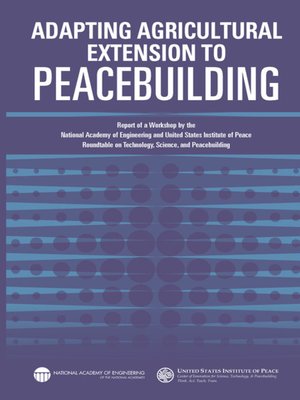Adapting Agricultural Extension to Peacebuilding
ebook ∣ Report of a Workshop by the National Academy of Engineering and United States Institute of Peace: Roundtable on Technology, Science, and Peacebuilding
By United States Institute of Peace

Sign up to save your library
With an OverDrive account, you can save your favorite libraries for at-a-glance information about availability. Find out more about OverDrive accounts.
Find this title in Libby, the library reading app by OverDrive.



Search for a digital library with this title
Title found at these libraries:
| Library Name | Distance |
|---|---|
| Loading... |
Societies have sought to improve the outputs of their agricultural producers for thousands of years. In the 19th and early 20th centuries, efforts to convey agricultural knowledge to farmers became known as extension services, a term adopted from programs at Oxford and Cambridge designed to extend the knowledge generated at universities to surrounding communities. Traditionally, extension services have emphasized a top-down model of technology transfer that encourages and teaches producers to use crop and livestock varieties and agricultural practices that will increase food production. More recently, extension services have moved toward a facilitation model, in which extension agents work with producers to identify their needs and the best sources of expertise to help meet those needs.
On May 1, 2012, the Roundtable on Science, Technology, and Peacebuilding held a workshop in Washington, DC, to explore whether and how extension activities could serve peacebuilding purposes. The Roundtable is a partnership between the National Academy of Engineering (NAE) and the U.S. Institute of Peace (USIP). It consists of senior executives and experts from leading governmental organizations, universities, corporations, and nongovernmental organizations, was established in 2011 to make a measurable and positive impact on conflict management, peacebuilding, and security capabilities. Its principal goals are:







